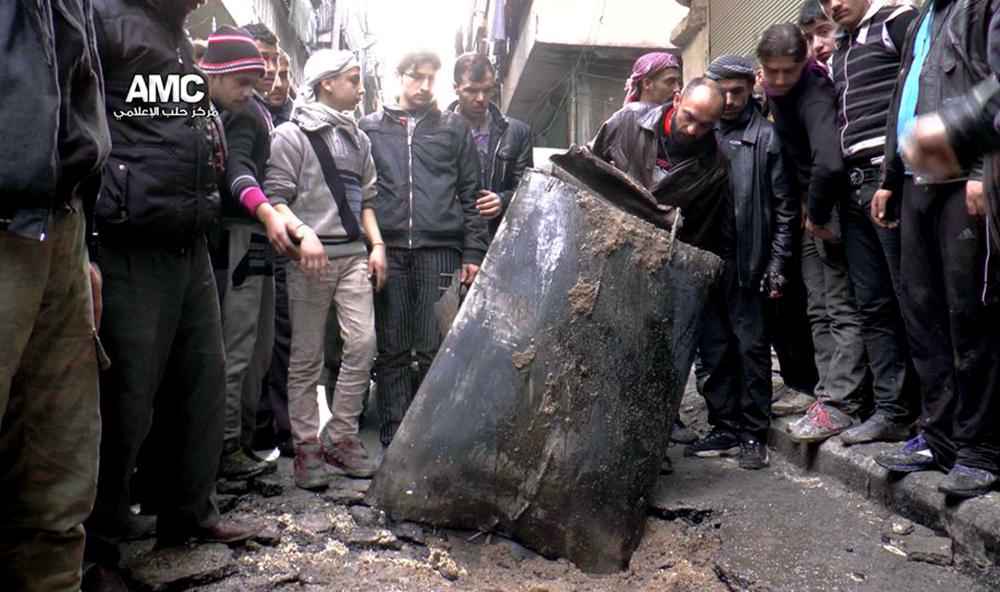The U.S. has warned Iraq against their use and Syria continues to drop them on neighborhoods.
WASHINGTON — In desperate efforts to gain ground on battlefields, frustrated governments in the Mideast and Africa are using barrel bombs against their enemies – launching the cheap, quickly manufactured weapons as a crude counter to roadside blasts and suicide explosions that insurgents have deployed with deadly success for years.
New evidence that they are being used in Iraq after being dropped on civilian populations in Syria and Sudan has raised concerns that governments in a number of unstable nations will embrace them.
Described as “flying IEDs” – or improvised explosive devices – barrel bombs have the power to wipe out a row of buildings in a single blast and can kill large numbers of people, including unintended victims.
“It’s fair to say that a lot of governments are losing control of the counterinsurgency,” said Michael Knights, an analyst at the Washington Institute for Near East Policy. “They’re also watching what they see in Syria, and they feel like their air power is what is making the difference.”
FROM THE SKY AND THE SEA
“Barrel bomb” is a catchall term for a large container packed with fuel, chemicals or explosives and often scraps of metal that, in recent years, have most often been dropped on targets from helicopters or planes overhead. However, they also have been found on Israeli beaches, where authorities believe they washed up after militants on the Gaza Strip released them.
They are attractive to governments that have the aircraft to bombard targets from the skies but limited munitions or money to launch enough conventional weapons, like missiles, to rival their enemies.
Sudan’s army began dropping barrel bombs into rebel areas starting in late 2011, according to human rights watchdogs, as the nation’s south split off and created a new country. In December 2012, Susan Rice, then U.S. ambassador to the United Nations, said she was “gravely concerned” about the reported attacks.
In Syria, forces controlled by President Bashar Assad began in 2012 an ongoing barrel bomb campaign against areas controlled by rebels and insurgents, killing thousands in his effort to reclaim power in the three-year civil war that has left more than 160,000 people dead. As recently as Wednesday, the State Department reported evidence of barrel bomb strikes on three neighborhoods in the divided northern city of Aleppo.
Last month, new evidence that Iraq’s army dropped between four and 10 barrel bombs on insurgent strongholds in the Sunni-dominated Anbar province, which borders Syria, spurred U.S. officials to warn Baghdad to immediately desist or risk losing American aid.
Four government officials in Washington and Baghdad said the attacks stopped within days of the U.S. demand. The government officials, all of whom are familiar with the mid-May conversations with Iraqi Prime Minister Nouri al-Maliki, spoke on condition of anonymity because they were not authorized to discuss the talks.
But several Iraqis interviewed last week in Fallujah told The Associated Press the bombings have continued. They said the attacks usually come at night, so they aren’t caught on video. Militants in Fallujah have boasted they have discovered about 20 barrel bombs that did not explode on impact and are using them to make their own weapons.
Fallujah resident Ahmed Abdul-Salam said a barrel bomb destroyed his small dairy factory last week.
U.S. officials are careful to note they have no independent evidence of the Iraqi army strikes. But Vice President Joe Biden urged al-Maliki during a May 16 phone call to make sure Iraqi counter-terror operations protect civilians and follow laws. Similarly, the U.N. Security Council on Thursday issued a statement that pointedly reminded Baghdad to comply with international human rights and humanitarian laws when fighting terrorism.
IRAQIS DENY USING THE BOMBS
The Iraqi government has denied using any bombs that kill indiscriminately.
The top Iraqi diplomat to the U.S., Ambassador Lukman Faily, said in an interview that Baghdad has investigated the reports of barrel bombs that activists and officials say allegedly were dropped over a two-week period last month in Fallujah, Garma and Saqlawiyah.
“Our investigation showed there were no indiscriminate bombs,” Faily said. Pressed on the specific issue of barrel bombs, Faily said, “We have seen evidence of them being used. But what we are saying is that they are certainly not government-sponsored, indiscriminate barrel bombs. They are not. We as a government do not use these weapons.”
Copy the Story LinkSend questions/comments to the editors.



Success. Please wait for the page to reload. If the page does not reload within 5 seconds, please refresh the page.
Enter your email and password to access comments.
Hi, to comment on stories you must . This profile is in addition to your subscription and website login.
Already have a commenting profile? .
Invalid username/password.
Please check your email to confirm and complete your registration.
Only subscribers are eligible to post comments. Please subscribe or login first for digital access. Here’s why.
Use the form below to reset your password. When you've submitted your account email, we will send an email with a reset code.